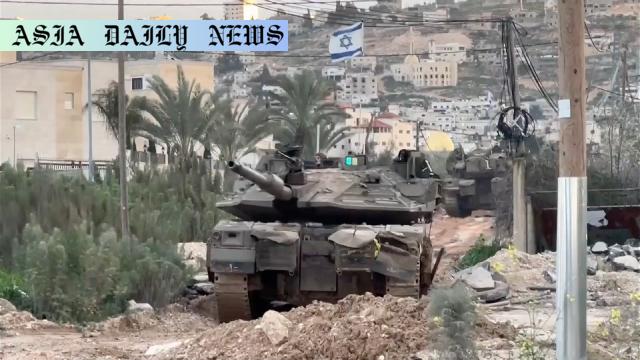West Bank: Israeli military deploys tanks for the first time in 20 years, citing counterterrorism. Over 40,000 Palestinians displaced.
- Israeli tanks deployed in West Bank for the first time in 20 years.
- Military described operations as ‘counterterrorism activities.’
- Over 40,000 Palestinians were displaced from refugee camps.
- UN Secretary-General expressed grave concern over rising violence.
- Jenin and northern West Bank targeted during military campaigns.

Introduction: A Significant Escalation
In a move that has drawn international attention and criticism, the Israeli military has deployed tanks in the West Bank for the first time in two decades. This unprecedented step is reportedly part of intensified military operations in the region, targeting what Israel describes as ‘counterterrorism activities.’ The deployment has been met with widespread concern, with many observers citing the potentially grave implications for regional stability and human rights.
The Deployment and Military Objectives
The use of tanks in the occupied West Bank is a stark reminder of the Second Intifada, a period marked by heightened violence and significant military operations. On Sunday, armored vehicles, including tanks and bulldozers, rolled into refugee camps in the northern city of Jenin. Israeli Defense Minister Israel Katz stated that over 40,000 Palestinians had been removed from these camps, with plans in place to occupy and secure the cleared areas for at least a year.
Katz emphasized the need to prevent residents from returning to the camps, stating that this is necessary to avoid the resurgence of violence and terrorism. However, such actions have deeply affected the Palestinian population, raising questions about the long-term humanitarian impact.
International Reactions and Rising Concerns
The deployment of tanks has sparked significant international criticism, with UN Secretary-General Antonio Guterres expressing grave concern. Guterres highlighted the increasing violence in the region, including acts carried out by Israeli settlers. He also reiterated UN opposition to any actions that could lead to annexation of the occupied territories.
Additionally, media outlets have noted that this is the first time such force has been used in the West Bank since the 2002 Second Intifada, a period defined by widespread violence and unrest. The actions raise critical questions about the future of Israeli-Palestinian relations and whether such escalations will further deepen divisions.
Impact on the Palestinian Population
The deployment of tanks and heavy military operations has had devastating consequences for the Palestinian population. Refugee camps in Jenin, already among the most vulnerable communities, have seen massive displacement. Approximately 40,000 Palestinians have reportedly been removed from their homes, and the Israeli military has declared that residents will not be allowed to return.
This policy of forced displacement risks exacerbating the already dire humanitarian situation faced by Palestinians in the occupied territories. With infrastructure in the camps destroyed and limited access to essential services, the displaced population is left in a precarious position.
Historical Context and Future Implications
The reintroduction of tanks in the West Bank highlights the ongoing tensions between Israel and Palestine. The last time such measures were undertaken was during the peak of the Second Intifada, a period that remains etched in the collective memory of both Israelis and Palestinians. This return to heavy militarization indicates a potential shift in Israel’s approach to managing security concerns in the region.
However, the long-term implications of this escalation are uncertain. While Israel may achieve short-term security objectives, the underlying issues that fuel the conflict remain unaddressed. Without meaningful engagement and dialogue, the cycle of violence is likely to continue.
Conclusion
The deployment of tanks in the West Bank serves as a stark reminder of the fragility of peace in the region. As tensions continue to escalate, the international community must play an active role in mediating the conflict and addressing the underlying causes of instability. Without a concerted effort to find a lasting solution, the cycle of violence and displacement is unlikely to end, leaving both Palestinians and Israelis to bear the devastating consequences.



Commentary
Heightened Tensions: A Critical Juncture
The deployment of tanks in the West Bank represents a critical turning point in the Israeli-Palestinian conflict. This return to heavy militarization evokes memories of the Second Intifada, a period that left an indelible mark on the region. While Israel’s stated objective is to combat terrorism, the human cost of such actions is undeniable. Tens of thousands of Palestinians have been displaced, leaving families uprooted and vulnerable.
Impact on Human Rights and Stability
The decision to clear refugee camps for an ‘extended stay’ raises serious questions about adherence to international human rights laws. Displacing populations on such a scale without providing viable alternatives poses a humanitarian crisis. Furthermore, these actions risk further inflaming tensions, leading to a cycle of retaliation and violence that benefits no one in the long term.
The Role of International Community
The international community has a responsibility to address this escalating situation. Statements of concern, such as those from the UN Secretary-General, must be backed by actionable steps to mediate and de-escalate the crisis. A diplomatic solution that addresses the root causes of the conflict is essential to avoid further bloodshed and displacement.
Final Thoughts
As the situation unfolds, the need for dialogue and humanitarian assistance becomes increasingly urgent. Both Israelis and Palestinians deserve to live in peace and security. The current escalation only serves to deepen divisions, making the prospects for a lasting peace seem even more distant. It is imperative that all parties, with support from the international community, work towards a negotiated settlement that ensures justice and dignity for all.